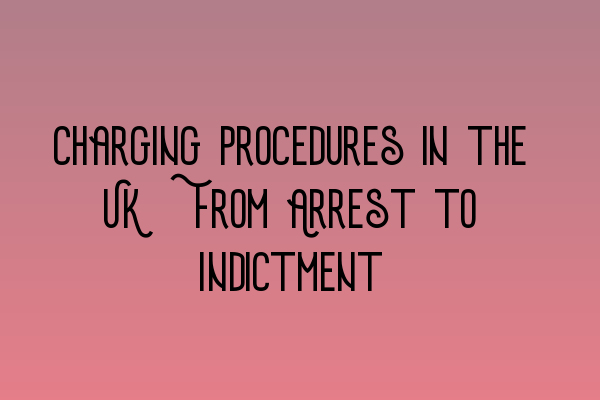Charging Procedures in the UK: From Arrest to Indictment
When it comes to criminal cases, understanding the charging procedures in the UK is crucial. From the moment of arrest to the eventual indictment, each step in the process plays a significant role in the outcome of the case. In this blog post, we will guide you through the various stages of charging procedures in the UK.
1. Arrest
The first step in the charging process is the arrest. When a person is suspected of committing a crime, the police have the power to arrest them. This is usually done if the police have reasonable grounds to believe that the individual has committed or is about to commit an offense. It is important to note that being arrested does not mean the person is guilty; it simply means they are being detained for questioning.
Legal representation is crucial at this stage. It is advisable to seek legal advice as soon as possible to ensure your rights are protected throughout the charging process.
2. Initial Detention
After the arrest, the suspect may be held in custody for a certain period known as the initial detention. During this time, the police can question the suspect to gather evidence and determine whether or not to proceed with the charges. The initial detention period can vary depending on the nature and complexity of the case.
3. Bail or Release
Following the initial detention, the suspect may either be released without charge or be granted bail. Bail allows the suspect to be released from custody, with certain conditions and restrictions in place. These conditions may include surrendering their passport, regular check-ins with the police, or restrictions on travel.
If bail is not granted, the suspect will remain in custody until the next stage of the charging process.
4. Charging Decision
Once the initial detention period is over, the police will determine whether to proceed with formal charges. They will review the evidence collected during the investigation and consult with the Crown Prosecution Service (CPS) to make this decision. The CPS is responsible for prosecuting criminal cases in England and Wales.
If the decision is made to proceed, the suspect will be formally charged with the specific offense(s) they are accused of.
5. Court Appearance
After being charged, the suspect will make their first appearance in court. This is usually referred to as the “initial hearing” or “first appearance.” During this hearing, the charges against the suspect will be read out, and they will have an opportunity to enter a plea – guilty or not guilty.
It is important to engage legal representation at this stage to ensure your rights are protected and to receive professional advice on how to proceed with your defense.
To learn more about the court process, you can read our related article: SQE Exam Prep: Essential Study Materials for Aspiring Solicitors.
6. Indictment
If the suspect pleads not guilty, the case will proceed to trial. During the trial, both the prosecution and the defense will present their cases, and the judge or jury will determine the defendant’s guilt or innocence. If the defendant is found guilty, an indictment will be issued, and the defendant will face sentencing.
For international businesses operating in the UK, understanding the legal system is crucial. You can read our related articles to learn more about legal challenges for UK businesses in the U.S. and the importance of ethical business practices.
In conclusion, the charging procedures in the UK are a vital aspect of the criminal justice system. From the initial arrest to the final indictment, every step in the process can have far-reaching consequences. Seeking legal representation and understanding the legal landscape are crucial for anyone involved in a criminal case.
